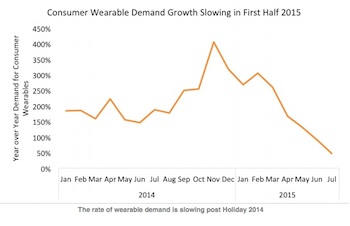 The demand for wearable devices, which include fitness bands, smartwatches, smart glasses, and other sensor-enabled devices, has decreased after reaching a high point in January, according to an Argus Insights report compiled from approximately 328,000 consumer reviews since January 2014.
The demand for wearable devices, which include fitness bands, smartwatches, smart glasses, and other sensor-enabled devices, has decreased after reaching a high point in January, according to an Argus Insights report compiled from approximately 328,000 consumer reviews since January 2014.
Argus explained that over the last 18 months, the wearable market has grown significantly. Demand was slow at the beginning of this period, the end of the 2013 holiday season. But then demand picked up and reached a peak in January -- it was four times as high as the year prior.
“Our analysis of review volume for the wearables market correlates directly with unit sales volume, and we have seen a significant slowing in consumer demand for both wearables in general and fitness bands in particular,” Argus Insights CEO John Feland said in a statement. “Consumers expect their wearables to do more than simply count steps, just as they expect to do more than just make phone calls with their handsets. It is clear that as the Apple Watch, the Moto 360, and the LG Watch Urbane outperform fitness bands in the hearts of consumers, Fitbit and others in this category will need to add more to their offerings to keep consumers engaged and coming back for more.”
The report found that after the Apple Watch was announced in September, consumers showed more interest in it than they showed for Fitbit and other wearable devices, but after more details about the Apple Watch were revealed, shortly before the holiday season, consumers started to focus on Fitbit again. Argus added that since Fitbit went public, the company has continued to gain mindshare with consumers.
Another Argus Insights report, this one of 33,000 consumer reviews from June to July 2015, found that Fitbit still dominates the mindshare of consumers, but smartwatches are making consumers happier. Argus found that the majority of users lose interest in their fitness bands after just 6 months. This statistic was also cited by another research firm, Endeavour Partners, in 2014.

















